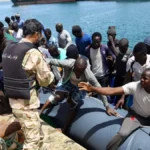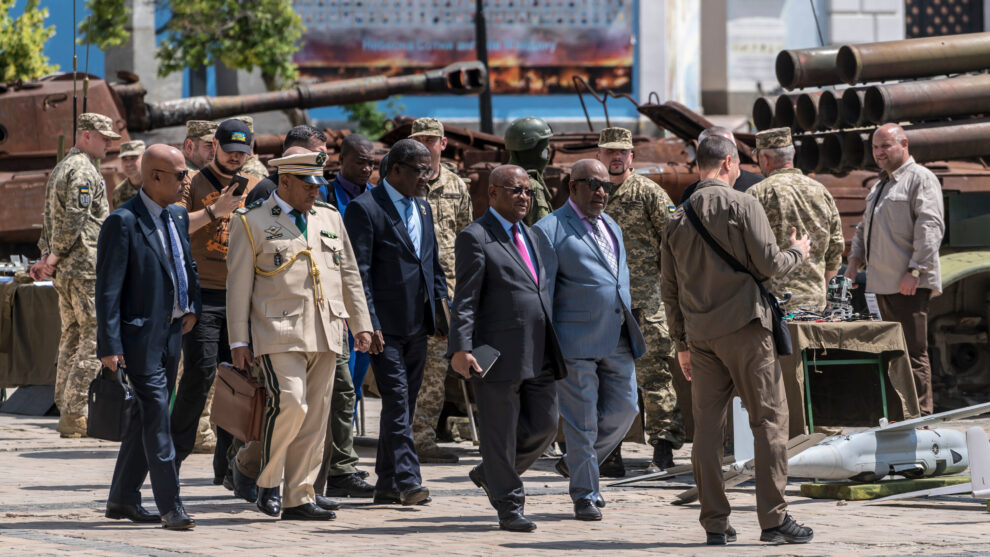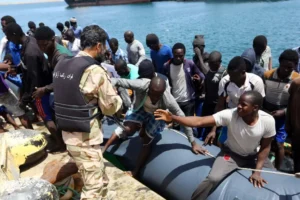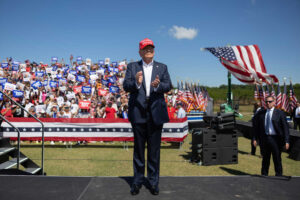Proposal to strike a diplomatic settlement with Russia is thought to have little chance of success
Russia has fired missiles on Kyiv this morning, according to Ukrainian authorities, just as a delegation of African leaders arrive to promote a peace plan.
Kyiv Mayor Vitali Klitschko confirmed that at least one explosion had been heard in the capital. According to the Ukrainian foreign minister, Dmytro Kouleba, “The Russian missiles are a message to Africa: Russia wants more war, not peace.”
South African President Cyril Ramaphosa and several other senior African political figures arrived in Ukraine on Friday morning to promote a plan that would provide a roadmap to Russian-Ukrainian peace negotiations.
Ramaphosa’s trip, which was announced by the South African presidency on Twitter, marks the first time he has visited the country since the Russian invasion.
He is part of a delegation that will also visit Russia on Saturday. Also included are Senegalese Premier Macky Sall, Zambian President Hakainde Hichilema, African Union chief Azali Assoumani, and representatives from the Congo, Uganda and Egypt.
The proposal they are offering, which has not yet been made public in full, is framed as a package of peace-building measures that will bring the war to a halt and thus clear the way for mediated negotiations.
Among its suggestions are a full withdrawal of Russian troops, the removal of all tactical nuclear weapons from the territory of Russian ally Belarus, the suspension of an International Criminal Court arrest warrant for Vladimir Putin, and broad sanctions relief, according to Reuters.
That last point is of particular relevance to the delegation because of international problems caused by the conflict, in particular when it comes to Ukrainian grain exports crucial for the global food supply.
While experts are sceptical that the peace proposal could work in practice – especially given Ukraine has only just begun its long-mooted counteroffensive in key Russian-controlled areas – it has been relatively well-received for at least demanding that Russian troops depart the country.
UN Secretary General Antonio Guterres gave a respectful but tentative verdict this week, describing it as “an important initiative based on the goodwill of a number of meaningful countries”.
Russia and Ukraine have so far shown little if any interest in various other peace plans suggested by third parties. For their part, Ukrainian leaders have been openly canvassing for support from their African counterparts, whom they have appealed to on the basis that Vladimir Putin’s war amounts to an act of colonial aggression.
Meanwhile, Russian influence in various African countries remains strong, whether exerted directly by the Kremkin-allied Wagner security group or provided in the form of aid and supplies.
Too close for comfort
Mr Ramaphosa’s government has been widely criticised for its amenable relationship with the Kremlin, which took hold long before Russia invaded Ukraine.
Particularly contentious are Ramaphosa’s decision to grant Putin diplomatic immunitydespite the international warrant for his arrest and an incident in which a Russian cargo ship was allowed to dock in Cape Town last year, allegedly to collect arms supplies.
When the visit was revealed earlier this year, the US ambassador to Pretoria told local media that “arming the Russians is extremely serious” and called on South Africa “to start practising its policy of non-alignment”.
It remains to be seen whether Putin will be welcomed to this year’s BRICS summit, bringing Russia and South Africa together with Brazil, China and India, all of whose governments have taken more ambivalent stances on the Ukrainian war than Kyiv’s western allies would have preferred.











